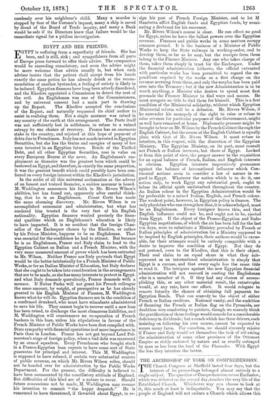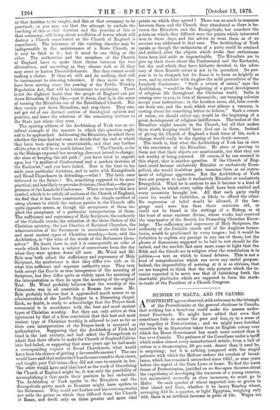THE ARCHBISHOP OF YORK ON COMPREHENSION.
Tak; Church Congress at Sheffield lasted four days, but the interest of its proceedings belonged almost entirely to a single subject. The question of Comprehension versus Exclusion, which was debated on the second day, touches the very life of the Established Church. Whichever way you choose to look at it, this much at least is indisputable. You may say that the people of England will not endure a Church which allows this or that doctrine to be taught, and this or that ceremony to be practised ; or you may say that the attempt to exclude the teaching of this or that doctrine and the practice of this or that ceremony, will bring about a collision of forces which will destroy a Church constituted as the Church of England is constituted. The tolerance of the existing disorder may be indispensable to the maintenance of a State Church, or it may be fatal to it ; but it must be one thing or the other. The authorities and the members of the Church of England have to make their choice between the two alternatives, and according as they choose well or ill, they may avert or hasten Disestablishment. But they cannot avoid making a choice. If they sit still and do nothing, that will be tantamount to choosing tolerance. If they move as they have been moving since the passing of the Public Worship Regulation Act, that will be tantamount to exclusion. There is not the slightest doubt that the people of England can put down Ritualism if they like,—put it down, that is, in the sense of turning the Ritualists out of the Established Church. But they cannot put down Ritualism, and stop there. They can- not get rid of one distinct section of theological opinion and practice, and leave the relations of the remaining sections to the State just where they were.
The opening address of the Archbishop of York was an ex- cellent example of the manner in which this question ought not to be approached. Addressing the Ritualists, lie asked them whether the time had not come to decide that the end at which they have been aiming is unattainable, and that any further efforts after it will be so much labour lost. "The Church, so far as the Bishops expound her meaning, does not intend to change; she aims at keeping the old path ;" you have tried to engraft upon her "a median-al Confessional and a modern doctrine of the Eucharist," and you have failed. Now is the time to lay aside your particular doctrines, and to unite with Evangelicals and Broad Churchmen in defending,—what ? The faith once delivered to the Saints ? No, something supposed to be more practical, and less likely to provoke divisions, than that,—the pro- gramme of the Lambeth Conference. When we turn to this new symbol, which is to satisfy all sections of the Church of England, we find that it has been constructed on the simple method of using phrases to which the various parties in the Church affix quite opposite senses, as though the acceptance of them im- plied the acceptance of a particular interpretation of them.
The sufficiency and supremacy of Holy Scripture, the authority of the Catholic creeds, the retention of the three Orders of the Christian ministry, the just liberties of National Churches, the administration of the Sacrament in accordance with the best and most ancient types of Christian worship,—here, said the Archbishop, is "the echo of the words of the Reformers them- selves." No doubt there is, and it is consequently an echo of words which have been a subject of controversy from the day when they were spoken down till now. Mr. Wood and Mr. Ryle may both admit the sufficiency and supremacy of Holy Scripture, the misfortune is that they differ tote ado as to what this sufficient and supreme authority says. They may both accept the Creeds as true interpreters of the meaning of Scripture, but they differ quite as widely upon the meaning of the interpretation as they do upon the meaning of the original Text. Mr. Wood probably believes that the worship of the Catacombs was in all essentials a Roman low mass. Mr. Ryle probably believes that it approached much nearer to an administration of the Lord's Supper in a Dissenting chapel. Each, no doubt, is ready to acknowledge that the Prayer-book ceremonial is in accordance with the best and most ancient types of Christian worship. But they can only arrive at this agreement by dint of a firm conviction that this best and most ancient type of Christian worship is adhered to just so far as their own interpretation of the Prayer-book is accepted as authoritative. Supposing that the Archbishop of York had lived in the last century, and had asked the Evangelicals to admit that their efforts to make the Church of England Calvin- istic had failed, or supposing that some years ago he had made a corresponding request to Broad Churchmen, what would have been his chance of getting a favourable answer ? The one would have said that unless the Church came round to their views, and taught pure Calvinism, they did not care to remain in her. 'The other would have said that hard as the work of liberalising the Church of England might be, it was only the possibility of accomplishing it that made their position in her endurable. The Archbishop of York speaks to the Ritualists and the Evangelicals pretty much as Erasmus might have spoken to the Reformers. Why could not Luther and his contemporaries put aside the points on which they differed from the Church of Rome, and dwell only on those greater and more vital points on which they agreed There was as much in common between them and the Church they abandoned as there is be- tween the Ritualists and the Evangelicals, but somehow the points on which they differed were the points which interested men in those days, and the advice to treat them as of no account was addressed to deaf ears. The Archbishop of York speaks as though the enthusiasm of a party could be retained and utilised, after the objects which evoke that enthusiasm have been laid aside as impracticable. The Ritualists are to give up their views about the Confessional and the Eucharist, but the zeal which they have hitherto devoted to the advo- cacy of these Romish errors is not to be quenched. Its pur- pose is to be changed, but its flame is to burn as brightly as ever, and to irradiate with its glow the mild generalities of the Lambeth Conference. "Such a return of union," says the Archbishop, "would be the beginning of a great development of religious life throughout the Christian world. India is coming over to you, in tens of thousands ; our teeming colonies accept your instruction ; in the heathen races, old, false creeds are worn out, and the soul, which ever abhors a vacuum, is casting about for something better to believe." Such a return of union, we should rather say, would be the beginning of a great development of religious indifference. The bodies of the Ritualists might remain in the Church, but all that makes them worth keeping would have died out in them. Instead of giving the Church of England a fresh lease of life, such a change would really be the signing of her death-warrant. The truth is, that what the Archbishop of York has in view is the conversion of the Ritualists. He aims at proving to them not that their objects are unattainable, but that they are not worthy of being pursued. Of course, if he can succeed in this object, that is another question. If the Church of Eng- land could become exclusively Ritualist or exclusively Evan- gelical, she would doubtless gain immense force as an instru- ment of religious aggression. But the Archbishop of York does not propose to make it exclusively Ritualist or exclusively Evangelical. What he is anxious to see it become is a kind of level plain, in which every valley shall have been exalted and every mountain brought low. All that each party really cares for would be forbidden, as likely to offend the other. No expression of belief would be allowed, if the lan- guage used were less than three centuries old, or could not be found in the writings of a Bishop, or at the least of some eminent divine, whose works had received the imprimatur of the Society for Promoting Christian Know- ledge. The sufficiency and supremacy of Holy Scripture, the authority of the Catholic creeds and of the Anglican formu- laries, would be proclaimed by every tongue ; but it would be forbidden to explain any passage in any one of them, lest the ghosts of dissensions supposed to be laid to rest should be dis- turbed, and the terrible fact once more come to light that the Bible and the Creeds are in religion what the constitution is in politics,—a text on which to found debates. This is not a kind of comprehension which can serve any useful purpose. Indeed, the impossibility of arriving at it is so obvious, that we are tempted to think that the only purpose which the in- ventor expected it to serve was that of furnishing forth the charitable platitudes which are supposed to form the stock- in-trade of the President of a Church Congress.



































 Previous page
Previous page